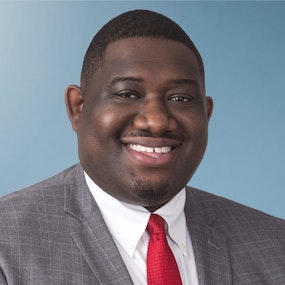ROBERT JOHNSON:
This is the award-winning Public Health Review Morning Edition for Friday, March 1, 2024. I'm Robert Johnson. Now, today's news from the Association of State and Territorial Health Officials.
JEFFREY EKOMA:
I just want to say thank you to all our members that participated in visits, and also members of our executive leadership team, who participate as buddies for making our Hill day successful. Thank you so much.
JOHNSON:
ASTHO Members were on Capitol Hill this week. Jeffrey Ekoma tells us how it went in this week's View from Washington, D.C. report.
Jeffery Ekoma, good morning. Welcome to Friday. I bet you're happy that it's Friday.
EKOMA:
Oh good morning, and absolutely. It's a Happy Friday. Pleasure to be talking with you.
JOHNSON:
You had a busy week on Capitol Hill, ASTHO members were in town and all over Congress. Tell us what happened; how it went.
EKOMA:
Yeah, it truly was a great week, we had around 10 health officials participate in meetings with their congressional delegation earlier this week. In addition to sharing updates on activities happening within their health departments, they also discuss Public Health Infrastructure Grant Program, and we're advocating for full funding for the WIC program. In addition to our state health officials, members from our island jurisdictions also participated in meetings with their congressional committees of jurisdiction to discuss challenges with Medicaid funding for those living in the territories, as well as a Compact of Free Association. I just want to say thank you to all our members that have participated in visits, and also members of our executive leadership team who participate as buddies for making our Hill day the huge success. Well, thank you so much.
JOHNSON:
Often you meet with members, other times you meet with our staff. How did those meetings go? How was ASTHO received on the Hill this year?
EKOMA:
Really well, I mean, I think our members and their insight was really appreciated with the many officers they spoke with. We had a lot of our members, they had meetings directly with members, and some of them had meetings with staff. But overall, it was really good. And it was really good just to be back on the Hill. This is the first time in about four years that we've had members in person on the Hill. So, it really was refreshing and really good.
JOHNSON:
And for those members who did not come to Washington this week, they still have the opportunity to engage. You don't have to be in Washington to do that. You can still carry the water for public health back home with the same members of Congress, right?
EKOMA:
Absolutely, there's so many different ways that you can engage congressional staff, whether it be sharing materials and activities that are happening within your health department, whether it's visiting district office staff, or inviting the member to join, or to participate in any activities of the health department. So, our team, we want to be helpful for any of the needs our members have, whether it's funny, new, and innovative ways to connect with staff, or whether it's to set up a meeting, whether it be in person or virtual, we want to be helpful, and this engagement is something that happens or needs to happen year-round, for it to be completely effective.
JOHNSON:
We thought one topic on the agenda this week would be these funding deadlines, March 1, today, and March 8, next week. But you're telling us this morning that it looks like at least one of them will be resolved temporarily. What's the update?
EKOMA:
Yeah, there was a lot of activity this week, as we— you mentioned, you know, March 1 was the deadline for four of the 12 appropriation bills, specifically, of those four included funding to fund programs like the FDA, and the WIC program, among other things. And Congress, it's likely that we will be avoiding a partial government shutdown later today. It's expected that Congress will pass a bill. And really what's included in the bill are a couple of new things. So one, there is a new deadline for six of the 12 bills. And that deadline will be March 8, and it includes funding for things such as agriculture, FDA, energy and water, military construction, transportation and housing and urban development to name a few. The remaining six bills, which include funding for labor, HHS, and education bills, or funding for public health programs have a new deadline of March 22. So, we're really pleased by that. That does seem to be greater interest in really bringing things to the finish line. It's also important to note that there are two really important dates that everyone should be aware of: one is March 7, which is State of Union address by the President, and then March 11, is a release of the President's FY 25 budget. But as always, these are things that we'll be tracking very closely in hope of right updates very soon on them.
JOHNSON:
So, a little bit of breathing room, maybe two or three days? And then you're right back in the soup.
EKOMA:
Absolutely. Absolutely.
JOHNSON:
Jeffrey Ekoma, thank you for taking the time to stop by and give us an update. We'll look forward to hearing from you or Carolyn Mullen next time.
EKOMA:
Absolutely, have a great weekend and talk to you soon.
JOHNSON:
ASTHO follows all of the policy moves in Congress and tells you about them in Legislative Alert emails, you can join the email list using the link in the show notes.
The number of carbon monoxide poisoning cases is on the rise in New Mexico. Stephanie Moraga-McHaley is with the State Health Department.
STEPHANIE MORAGA-MCHALEY:
Winter is one of those times when we're easily blindsided because we're focused on getting warm.
JOHNSON:
89 people have gone to emergency rooms this winter, one person died. Moraga-McHaley says the state works to raise awareness so people can protect themselves.
MORAGA-MCHALEY:
We have a page dedicated to carbon monoxide poisoning and it describes sources, symptoms, and tips on prevention of carbon monoxide poisoning. And the page also lists several resources and links to fact sheets and reports, including one on carbon monoxide poisoning and the proper use of generators.
JOHNSON:
Moraga-McHaley is the program manager of the State Environmental Public Health Tracking program, gathering and sharing data to help direct resources.
MORAGA-MCHALEY:
We also provide data on carbon monoxide poisoning related emergency department visits, hospitalizations and deaths, as well as calls that have been made to the New Mexico Poison and Drug Information Center for carbon monoxide poisoning.
JOHNSON:
You can learn more about the New Mexico program and read about the increase in carbon monoxide poisoning cases by clicking the links in the show notes.
JOHNSON:
Also, today, U.S. territories need more health data to make better decisions for people in their communities. ASTHO writes about the lack of data and the work to expand access and collection in a new blog article. Read it using the link in the show notes.
Finally, this morning, as you heard earlier ASTHO members were in Washington, D.C. this week. The agenda included visits to Congress and a special graduation event. We connect with people involved in both activities. Listen for those conversations beginning Monday.
Before we go a reminder also to follow this newscast on your podcast player and connect with ASTHO on social media. We are on LinkedIn, Twitter, and Facebook.
That'll do it for today. We're back Monday morning with more ASTHO news and information. I'm Robert Johnson. You're listening to the award-winning Public Health Review Morning Edition. Have a great weekend.






